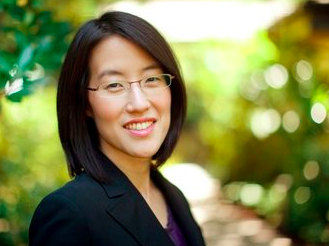aNewDomain — Ellen Pao’s gender discrimination lawsuit has the tech world talking about what it will mean if she wins a verdict against her former employer, a Silicon Valley venture capital firm.
It’s a crazy case. Among the highlights: an office affair gone wrong, with the jilted married guy accused of retaliating against the jilting single woman; a company ski trip for bros before hoes; juicy revelations about huge salaries and ridiculous work hours, including putting in time during a honeymoon.
So what does it mean?
Maybe it’s about the power of money.
 “What’s Really at Stake in Ellen Pao’s Kleiner Perkins Lawsuit,” asserts Emily Bazelon in The New York Times, is the tantalizing possibility of “a cultural shift” in Big Tech, infamous for its young white male-dominated “bro” culture. (They used to call that “frat boy”crap.)
“What’s Really at Stake in Ellen Pao’s Kleiner Perkins Lawsuit,” asserts Emily Bazelon in The New York Times, is the tantalizing possibility of “a cultural shift” in Big Tech, infamous for its young white male-dominated “bro” culture. (They used to call that “frat boy”crap.)
“As the kingmakers [VCs] who decide which start-ups survive, they have the leverage to make the industry more receptive to women and their ideas or continue to reinforce the ‘brogrammer’ norm,” she writes. (Disclosure: Bazelon edited some of my work in the 1990s.)
Or maybe this lawsuit is about the tightrope women have to walk in the American workplace.
“The real drama is in the more mundane charges, about slights familiar to any woman in any workplace that are rarely aired in public, much less in a courtroom,” Claire Cain Miller writes, also in the Times. “Ellen Pao, a former junior partner, was told that she didn’t speak up enough and was too passive — but also that she spoke up too much and was pushy and entitled.”
Could Pao v. Kleiner Perkins Caufield & Byers be about the paucity of women?
“What is really under examination in this trial is the question of why there are so few women in leadership positions in Silicon Valley. At stake is any hope that the tech world can claim to be a progressive place, or even a fair one.” That’s David Streitfeld. Also in the Times.
Three different takes in the same paper!
Here, let me help make things more confusing — with yet another interpretation of why it matters.
Ellen Pao’s case is really about accountability.
The Silicon Valley that emerged after the dot com crash of 2000 has been a cultural and legal Wild West, dominated by companies run by executives who don’t think the rules apply to them.
Every human resources hack knows that gender discrimination is strictly prohibited under federal law. That’s been true for decades.
Google, the biggest tech employer, has a 70 percent male-30 percent female workforce. (It’s 79 percent – 21 percent for “leadership” positions.) Men in the Valley earn 61 percent more than women with the same job and qualifications. It’s actually getting worse.
Numbers like that lead to one obvious conclusion: the bros aren’t even trying. Because they’re not worried about the EEOC, or PR, or anything at all.
The rules-are-for-peasants mentality was epitomized by late Apple chief Steve Jobs, who famously parked in handicapped spaces. “He seemed to think the blue wheelchair symbol meant the spot was reserved for the chairman,” Andy Hertzfled wrote.
As I reported late last year, tech companies violate federal laws against age discrimination even more brazenly than those concerning gender — which is saying something. Many tech ads overtly state that anyone not “young” need not bother to apply. Electronic Arts had no employees over age 35.
And they’re just as bad on race. Whites and Asians are radically overrepresented; Latinos and blacks, if and when you can find them in Silicon Valley, are paid less than whites for the same job.
It’s not just legal stuff. Silicon Valley firms ignore the golden rule of business that the customer is always right. For the Valley, the customer — you and me — are sources of data and money to be exploited and drained dry without so much as a thank you.
Got a problem with Facebook? Too bad.
They don’t have a single customer service rep you can telephone for help when, say, your creepy ex-boyfriend posts photos of your intimate moments.
Facebook also resets the default on your “privacy” settings to “public” without asking. Nice respect for the fundamental American right to privacy.
Sorry, Mark Zuckerberg — I could have just as easily picked on any other company. Nothing personal.
Back to Ellen Pao.
If she wins, which is by no means certain, it will not mean that Silicon Valley will begin treating its customers with respect, or hire people over age 35. What it will mean is that they have to follow the same rules as the rest of us — or pay the price.
For aNewDomain, I’m Ted Rall.
Image above: Ellen Pao.
Cover image of road leading into Silicon Valley: Wikimedia Commons













